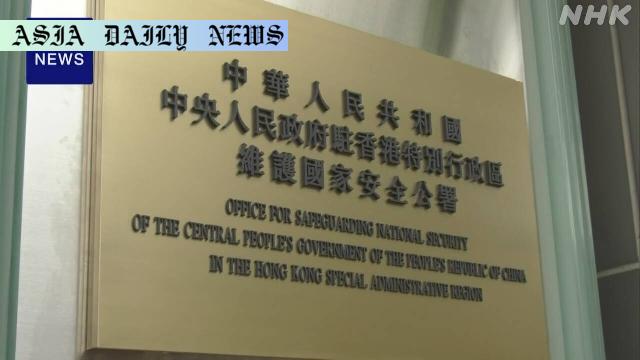National Security: Joint operation by China’s security office and Hong Kong police targets individuals for collusion charges.
- National Security: First known probe by China’s office in Hong Kong is revealed.
- Six individuals and one organization investigated under NSL.
- The law allows China’s office to supervise, investigate, and prosecute cases with foreign elements.
- Investigation centers around alleged collusion with external forces.

Introduction to the Landmark Investigation
In a groundbreaking announcement, Hong Kong authorities have revealed the first publicly acknowledged investigation by China’s Office for Safeguarding National Security within the territory. This joint operation involving both China’s security office and local Hong Kong police marks a critical juncture in the enforcement of Hong Kong’s National Security Law (NSL). The operation has targeted six individuals and one organization accused of colluding with external forces between 2020 and June 2022.
The Implications of Hong Kong’s National Security Law
The National Security Law, introduced in 2020, has significantly reshaped Hong Kong’s political and legal landscape. With provisions granting broad powers to China’s national security apparatus, the law has been instrumental in addressing cases deemed as threats to national stability. It empowers China’s Office for Safeguarding National Security to supervise, guide, and even directly handle complex cases involving foreign elements. The recent disclosure of this investigation highlights the expanding role of the office in Hong Kong’s governance.
The Allegations: Collusion with External Forces
The individuals and organization under investigation are reportedly suspected of colluding with foreign entities to undermine national security. While specific details of the allegations remain undisclosed, the implications are far-reaching. Such investigations underscore the Chinese government’s commitment to addressing perceived threats and ensuring compliance with the NSL. Critics, however, argue that the vague definition of collusion, combined with the broad enforcement powers under the law, raises concerns about potential overreach and suppression of dissent.
Legal and Jurisdictional Dynamics
One of the unique facets of the NSL is its provision for cases to be charged and prosecuted in mainland China courts. This approach is intended for scenarios involving complex foreign-related cases or issues of national urgency. The direct authority granted to China’s security office has sparked debates about Hong Kong’s autonomy under the ‘one country, two systems’ framework. The investigation further raises questions about jurisdictional implications and the balance of power between Hong Kong authorities and mainland oversight.
Conclusion: A Precedent with Broader Ramifications
The unveiling of this first-ever probe serves as a critical precedent for future enforcement of the National Security Law in Hong Kong. It signifies an increased presence and influence of China’s national security apparatus in the region. As Hong Kong navigates the evolving political landscape, the broader implications of such investigations remain to be seen. For many, the case serves as a litmus test for the enforcement of the NSL, its compatibility with international legal norms, and its impact on Hong Kong’s unique socio-political structure.



Commentary
Analyzing the National Security Investigation
The recent revelation of an investigation conducted by China’s Office for Safeguarding National Security in Hong Kong is profoundly significant. This development sheds light on the growing influence of Beijing’s security oversight in the territory, introducing new dynamics into the political and judicial framework. The move not only reaffirms the Chinese government’s strong stance on safeguarding national security but also spotlights the extensive powers granted to the mainland’s security office under the National Security Law.
Concerns Over Autonomy and Transparency
This case ignites discussions about the potential erosion of Hong Kong’s autonomy. Critics have raised concerns that the broad provisions of the National Security Law might be leveraged to suppress dissent and curtail freedoms. While the need for national security measures is undeniable, the lack of transparency into cases labeled as involving ‘external forces’ fuels apprehensions. The ability of China’s security office to supervise, intervene, and prosecute in Hong Kong exemplifies the ongoing shift in the ‘one country, two systems’ framework.
Looking Ahead: Ensuring Balance and Justice
Moving forward, it is crucial for both Chinese and Hong Kong authorities to address concerns surrounding the law’s application. Ensuring a balance between enforcement and transparency will be essential in maintaining both public trust and Hong Kong’s international standing. The investigation serves as a test of the NSL’s provisions and their impact on governance and freedoms in the territory. As new details emerge, the global community will be watching closely, assessing the broader ramifications for Hong Kong and the geopolitical landscape of the region.